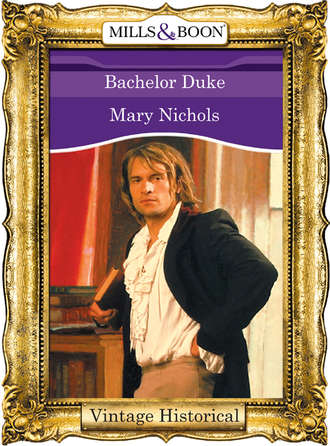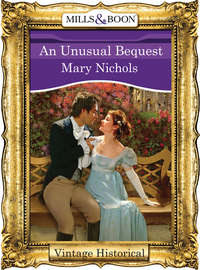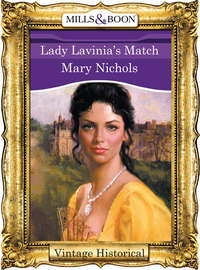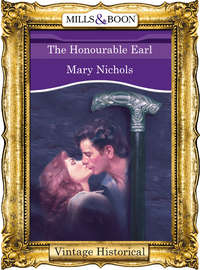
Полная версия
Bachelor Duke
All this conjecture only served to show her how little she knew of the family and how foolish she was to expect anything from them. She was beginning to regret the letter she had sent introducing herself. She had not exactly thrown herself on his Grace’s mercy, but had told him she was alone and returning to England and would like to call on him. Had it sounded like begging? Or too proud? Tossing and turning, as the vessel tossed and turned, she could find no rest and wished herself at the bottom of the sea, a wish she expected to be granted at any moment. But she slept at last; when she woke, the sea was calm and so was she. Whatever lay ahead she would meet head-on. Her pride would sustain her.
‘Harri, do I know anyone called Sophia Langford?’ James asked his sister.
‘My dear man, you surely do not expect me to remember the names of all your little bits of muslin? They change almost daily. Why do you ask? Is some young lady importuning you? Oh, you haven’t landed yourself in a coil, have you?’
‘No, certainly not. Credit me with a little discretion, I beg you. And do you suppose I would forget the name of any lady with whom I choose to spend my time?’
James Dersingham, fifth Duke of Belfont, was neither old nor married. Yet. But when a Duke is single and very wealthy, he is bound to attract the attention of mamas with marriageable daughters; if he is also young and handsome, those same mamas will eagerly fall over themselves to make sure their daughters are noticed. He would have to be made of stone not to be flattered. This particular Duke had a string of hopeful would-be brides hanging on his every word and gesture, and it mattered not one jot that he had the reputation of being something of a rake. Money and an elevated position in society would more than compensate for that. But he was becoming very bored with it all.
‘Then why did you ask?’
‘This Sophia Langford claims to be kin. And you may be right about her importuning. I have a letter here in which she says her mother died two years ago and now her father has died too and left her without support. She is lodging with a friend of her mother’s in Naples, but she cannot continue to impose on her good will. I gather she thinks I should make myself responsible for her.’
‘Langford,’ Harriet said thoughtfully. ‘Didn’t Papa have a niece who married a Langford?’
‘Did he?’
‘Yes, now I come to think of it, he did. Do you remember Uncle Robert? He was Papa’s older brother and would have inherited if he had not died so young. He had a daughter, Louise—I think it was Louise—who married Lord Langford. He was a gambler and a wastrel and the family refused to acknowledge him. I think he ruined them and they went to live abroad.’
Lady Harriet Harley, at thirty-six, was two years older than her brother and, since the death of their mother when they were both young, had been his mentor and confidante, which continued even after her marriage to Sir Granville Harley. Their father, the fourth Duke, had died the year before and James had inherited a vast fortune, several properties and the responsibility that went with them, much sooner than he had expected to; he was finding it hard work. It was doubly so at this time because he was on the Regent’s staff, one of those responsible for his security, and, what with the celebrations attached to the victory over Napoleon and his Highness’s unpopularity, he was expected to be everywhere at once. The last thing he wanted was the added responsibility of a child. ‘That accounts for the letter coming from Italy. But what can I do about it? I am a bachelor. I don’t know anything about children…’
Harriet tilted her head on one side and smiled half-mockingly at her brother. ‘If you found yourself a wife, you might soon learn…’
He gave a bark of a laugh. Harriet was always urging him to settle down and marry, but he had never yet met a woman who came anywhere near his exacting standards. Either they were too young and foolish, too serious and stiff-rumped or too old and ugly. Besides, he was too busy and, when he wasn’t busy, was amusing himself with young ladybirds who had no ambition to be duchesses, which relieved him of the problem of having to think about it. ‘That has nothing to do with this.’ He tapped the letter in his hand. ‘I can’t have her here. And how can I be sure she is who she says she is? She might be an impostor.’
‘I have no doubt we could soon establish her credentials with a few pertinent questions.’
‘We?’
‘Of course we. As you so correctly pointed out, you are a bachelor. I could not leave the matter to you, could I? You would frighten the poor thing to death. And, I confess, I am curious. When is she arriving?’
Her referred again to the letter. ‘She doesn’t say, which only goes to prove how empty-headed she is. Does she suppose I will sit at home and wait for her arrival?’
‘No doubt she is waiting for you to reply and invite her to stay.’
‘And you think I should?’
‘James, she has lost her parents. She is alone and probably very frightened. You would give a stray puppy a home under such circumstances, so why not a child? Why, Dersingham Park is so big, you would not even notice she was there.’
This was true, but he was still reluctant. He could foresee all manner of problems. What did a girl brought up in Italy know of English life? Was he expected to provide her with a maid, a companion, a school mistress and a school room to put her in? Would he have to entertain her? Did she know how to behave in polite society? And, in the fullness of time, would he have to give her a come-out and a dowry? It was all beyond him. It was not the cost—he could bear that and not even notice it—it was the responsibility. Oh, he knew he would have to put his mind to such things when he married and had children of his own, but other people’s? Besides, he had no intention of marrying until he was good and ready, and a little waif was not going to make him change his mind about that, whatever Harriet said.
On the other hand, if she really was a relation and in dire straits… James Dersingham, fifth Duke of Belfont, man of the world, reputed rake and steadfastly single, had a compassionate heart and could readily imagine what it must be like to be alone and unprotected. He smiled at his sister; it was a smile that transformed his rather austere countenance. His grey-blue eyes twinkled and his firm mouth curved into a smile, so that his whole face lightened. ‘Very well, but you write to her. It would be much better coming from you.’ Which was a statement with which she heartily agreed. ‘Besides, I must go. His Highness has taken it into his head to meet the King of France at Dover and I have been given the task of organising the coaches and outriders. He is not content but that we must have a triumphal procession.’
Having left the problem of Sophia Langford in the capable hands of his sister, he went on his way, prepared to forget all about the little waif. It would take weeks for the exchange of letters and even more before the child arrived; by then, perhaps the frenzy that had seized the populace over winning the war might have died down and he could give her the attention she deserved. By the time he arrived at Carlton House, the Regent’s residence, he was once more the urbane and efficient equerry, who appeared to have no other life than pleasing his sovereign.
In spite of being several hours behind the royal vessel, The Sea Maid was obliged to ride at anchor outside Dover harbour while the King and his retinue disembarked, which did nothing to calm Sophie’s mounting nervousness. The first sight of the cliffs of her homeland had had a strange effect on her, which was totally unexpected. It was almost twelve years since she had left it, a nine-year-old child, looking forward to the adventure, unafraid because she had two loving parents to take care of her. She had no idea she would not set foot on English soil again for so many long years in which she would live through a savage war, lose both her parents and grow up all too quickly. Deep inside her, she felt a stirring of a strange emotion, a feeling of coming home, as though the place, if not the people, welcomed her. It made her impatient and she paced the deck, unable to stand still.
‘Ah, we are on the way again,’ Lord Myers said as the rattle of the anchor being wound up came to their ears. ‘It should not be long now and we will be on terra firma again.’
‘Lady Myers will be much relieved,’ Sophie said, for her friend had been confined below decks with mal de mer for the whole of the eight-hour crossing.
Sailors swarmed along the spars and the sails filled and gradually they inched their way into the quayside beside the royal vessel and came to a stop. Sophie went below to help Lady Myers on deck, while his Lordship spoke briefly to the captain about the unloading of their baggage. Half an hour later they were standing on the quay looking about them. The area was thronged with people, far more than any of them had foreseen. Besides seafaring men and the populace of the town, there was a company of Horse Guards in magnificent uniforms and civilian gentlemen on horseback dressed lavishly, their riding hats decorated with white cockades. ‘In honour of the Bourbons,’ Lord Myers said.
It seemed to be organised chaos, for in the middle of it all were several carriages, one of which bore the arms of the Regent. Of that gentleman there was no sign, nor of the King of France, but there was a man standing by the last coach, directing affairs. Sophie found herself surreptitiously watching him. In the face of all the confusion, he seemed calm. He was not in uniform, but in a magnificent riding coat of blue cloth that fitted his figure so closely she was able to make out the bulging muscles of his shoulders and arms beneath it. He wore soft doeskin breeches and boots that would have done duty for mirrors, a pale blue waistcoat and a pristine white cravat. His hair, beneath his tall riding hat, was fair and curled into his neck. Her heart gave a wild leap as he looked towards her, but the glance was only momentary before he turned away to speak to one of the uniformed officers, almost as if she were invisible. Perhaps she was. She felt suddenly forlorn and dowdy in her brown cloak and straw bonnet with its black ribbons.
‘I suppose they have come to meet the King,’ Lady Myers said. ‘And we shall be left to lag behind as we were before.’
‘It certainly looks like it, ‘her husband agreed. ‘I am come to think that it was not a good idea to attach ourselves to his entourage. I am very sorry to have suggested it, my love.’
‘Let us go into the hotel and have some refreshment,’ she said. ‘Perhaps by the time we are rested the crowd will have dispersed and we can continue our journey in peace.’
Lord Myers led the way, but they were stopped from entering by the same gentleman Sophie had noticed earlier, who had evidently seen their intent and hurried to intercept them. ‘I am sorry, sir, ladies,’ he said politely but firmly. ‘But you cannot enter, not until his Royal Highness and the King leave.’
‘Why not?’ Sophie demanded. ‘It is an inn, is it not, and bound by law to provide refreshment?’
He turned towards her. The brown cloak and the plain bonnet did not indicate a young lady of substance; she was probably the older lady’s companion, someone who was supposed to melt into the background, a shadow of her employer, but the sharp rejoinder and the bright eyes told him she did not enjoy her role. Those eyes were blazing defiance, but at the same time there was in their brown depths a hint of doubt. She was sure of her facts, but not of her position. It made her seem vulnerable. On the other hand, he could not allow her to dictate to him. His job was to protect his royal employer and he would be failing in his duty to allow anyone to cross the threshold. Assassins—those who wished the Regent ill, and there were many—could be female as well as male.
‘Indeed, miss, but the needs of his Highness must be met first.’
‘Then where are we to go?’ Lady Myers put in before Sophie could make matters worse by insisting on entering. ‘We have come off the packet and need refreshment before continuing our journey.’
‘Then let me direct you to the garden at the rear. There are tables and chairs there. I will ask Captain Summers to request the landlord to bring you cushions and refreshments. I am sorry I must deny myself the pleasure of conducting you myself, but my duties do not allow me to leave the escort.’ He turned and beckoned to a young officer and spoke briefly to him before bowing and returning to the carriage, just as two very fat gentlemen waddled out of the inn and made for the Prince’s coach.
‘My, is that the Regent?’ Sophie whispered, recognising the other as the one-time Comte de Provence, now King of France.
‘Yes, it is,’ Captain Summers, who was young and cheerful, answered her as the coach creaked ominously when the pair were helped into it. ‘I am afraid you are bound to be delayed if London is your destination. There is quite a procession and it will not be travelling very quickly.’
‘Oh, we are becoming used to it,’ Sophie told him.
They watched the procession set off: the Horse Guards, outriders, carriages containing the royal retinue and, last of all, the state carriage drawn by eight cream horses, its occupants smiling and waving to the crowds who seemed singularly disinterested. Behind and a little to one side rode the handsome aide who had so taken Sophie’s attention, riding a magnificent black stallion. He looked about him as he rode as if expecting trouble.
‘You may enter the inn now,’ Captain Summers said, conducting them inside. ‘Regretfully I must leave you and take up my position in the cavalcade.’ He touched his tall hat in salute and strode away to where his horse was tethered.
‘What a fuss!’ Lady Myers said as they found their way to the dining room. ‘My Lord, let us stay here until they are well on their way, for I should be mortified to be too close behind those two pretentious coxcombs. We might be mistaken for one of the party.’
His lordship agreed and, in a way, so did Sophie, who had been less than impressed by the two rulers. On the other hand, the gentleman on the black stallion and the young captain of the Horse Guards were much more interesting, especially the taller one; she would not mind following on behind him. If only she was not dressed so shabbily, if only she had a little more aplomb, she might have smiled at him and then, instead of looking straight through her, which he had done, even when addressing her, he might have smiled back… She shocked herself to think she could have such improper thoughts and quickly turned her attention to her host, who was reciting the bill of fare in a swift gabble as if he could not wait to be rid of all his guests and have a little peace and quiet. She must remember she was in England now and must behave with the decorum Lady Myers expected of her. And that meant not challenging authority. If she wanted the Duke to give her a roof over her head—she could not call it a home, having no idea if it could ever be that—she must curb her tongue and be meek and docile. Any rebellious or unladylike thoughts and opinions must be kept for her book.
Chapter Two
Sophie woke up the next morning, wondering where she was. It was much more sumptuous than her room in Naples. She sat up and looked about her. The sun was shining through lightweight curtains and she could make out solid furniture; besides the big bed there was a washstand, a wardrobe, a dressing table, another small table in the window flanked by two chairs and a couple of cupboards in the fireplace recess. A clock on the mantel told her it was half past ten. She had not slept so late in years! She scrambled from the bed, padded across the thick carpet and drew back the curtains to find herself looking out on a busy street. Not Naples, not Paris, but London.
It all came back to her then: the long, exhausting journey by land and sea, the slow progress behind the Regent’s procession, which they had come up with only an hour after leaving Dover. The Regent was either very vain or very stubborn because he had insisted on stopping to greet his people, even when they were only a half a dozen on a street corner who looked to Sophie as if they had only been waiting to cross the road. Whenever they stopped the tall equerry was in evidence, shepherding people away from the royal carriages, looking about for trouble, trying his best to keep the cavalcade moving. Sophie wondered what his name was and if he had a title and decided he must be a lord at the very least. In her imagination she dubbed him Lord Ubiquitous because he seemed to be everywhere. No doubt if anything bad befell his charges, he would have to answer for it.
He had controlled his horse with consummate skill, was polite if a little frosty to the people around him and smiled when speaking to the Regent and his guest. Not for a moment had he shown any sign of impatience, but somehow Sophie sensed it was there, carefully hidden. It revealed itself in the way he carried himself, in small gestures, in the lifted eyebrows to Captain Summers when his Highness insisted on stopping. On one occasion the Regent had beckoned to a little urchin playing in the dirt and given him some small token, though the child seemed to have no idea what to do with it. Lord Ubiquitous had leaned down from his mount and whispered something, which made the boy laugh and he had run off, clutching his prize.
There had been no possibility of overtaking the royal carriages, so Lord Myers had instructed the coachman, hired at Dover, to stay well back, and Sophie was able to look about her. The countryside was verdant, the sun had a gentle warmth, not the uncomfortable heat of Naples. There were people working in the fields, plodding behind working horses. In the meadows cattle grazed and young lambs trotted behind their mothers, bleating for attention. This was the England she remembered, the England her mother had yearned for all the years of her exile. Was that why it felt so much like coming home?
London, when they reached it, was packed, just as Paris had been. Rich and poor jostled each other, carriages vied for space with carts, and the noise of it all assailed her ears: grinding wheels, ringing hooves, neighing horses and voices, some high-pitched, some raucous. When the crowd saw who sat in the grand carriages smiling and waving fat beringed hands at them, they were openly hostile. Sophie heard one wag shout, ‘Where’s your wife?’ And this was echoed by others until it became a chorus.
‘What do they mean?’ she asked Lord Myers.
‘Oh, they are referring to the Princess of Wales,’ he said. ‘She is far more popular than her husband, who tries very hard to pretend she does not exist. The people like to remind him of her now and again.’
Their ways diverged after they crossed the river and the Myers’s coach went on to Holles Street, where the servants had been expecting them hours before. It was extremely late, the dinner spoiled and they had to make do with a cold collation before tumbling into their beds.
And now it was morning, the first day of her new life and whatever was in store for her, she would have to make the best of it. Until she had made her call on the Duke, she could make no plans, and meeting the Duke was something that filled her with trepidation. She dressed hurriedly and went down to the breakfast parlour where she found Lady Myers immersed in the morning paper, which reported the arrival of the French King and a great deal of other news, some of it political, some of it mere gossip. She laid it aside on Sophie’s entrance. ‘How did you sleep, dear?’ she asked.
‘Like the dead,’ Sophie said. ‘I was worn out.’
‘That is hardly to be wondered at. Shall we stay at home and rest today? Tomorrow will be time enough for paying calls if you are too fatigued.’
Sophie was very tempted. It would be so easy to presume upon her ladyship’s generosity and do nothing, but her circumstances and sense of fair play would not allow it. ‘Unless you have other plans, I think I should make my call at Belfont House first,’ she said. ‘It has been playing on my mind. If the Duke is from home, I can ascertain if he is at Dersingham Park.’
‘Do you not think you should purchase a new gown before presenting yourself?’ her ladyship suggested.
Sophie looked down at the lilac muslin she had fetched out of her trunk. It was so simple as to be childlike, with its mauve ribbons under the bosom and round the puffed sleeves. Its only decoration was a little ruching round the hem, which had been mended more than once. ‘You think I should be in mourning?’
‘Do you?’ Lady Myers countered.
‘No. I mourned Mama and I mourned the man my father once was, but that was three years ago and, strangely enough, Papa’s last words to me were, “Do not mourn me, I am unworthy of it.”’
‘Then lilac is perfectly fitting, except that gown is very simple.’
‘Simple things do not become outdated so quickly and I cannot afford to buy something just because the fashion changes.’
‘Hmm, no doubt you are right,’ her ladyship said. It was sympathy and help the girl needed and strutting about in the height of fashion would not further that end, though she was wise enough not to utter her thoughts. ‘I will order the carriage for noon.’
Sophie was shaking with nerves by the time the barouche drew up outside the house in South Audley Street and only Lady Myers’s hand under her elbow prevented her from taking flight. She was being a ninny, she told herself sternly. There was nothing to be afraid of; she was her mother’s daughter and Mama had always told her to be proud, hold up her head and look the world in the eye, and that is what she would do. If the Duke of Belfont refused to recognise her, then so be it.
‘Lady Myers and Miss Sophia Langford,’ her ladyship said, handing the liveried footman her card. ‘We wish to speak to the Duke on a personal matter.’
‘I will ascertain if his Grace is receiving, my lady,’ he said pompously. ‘Please be seated.’ He waved them to a row of chairs ranged against the wall of the vestibule and disappeared down a marble tiled hall, his back stiff, his white-wigged head held high.
Lady Myers sat down, but Sophie could not sit still and began looking about her. There was an ornate cantilever staircase that set off at the centre of the hall and divided on a half-landing before climbing again to a gallery lined with pictures. On each side of the stairs the hall was lined with doors, all of which were closed. The footman had gone through one of them and shut it behind him.
‘Oh, I wish I had never come,’ Sophie whispered. The grandeur of the place was overwhelming.
‘Take heart, dear. I am right beside you and I will make the introductions.’
The footman returned, leaving the door ajar. ‘This way, ladies, if you please.’
They followed him and waited while he announced them. ‘Your Grace, Lady Myers and Miss Langford.’ Then he stood aside for them to enter the room.
A second later Sophie found her jaw dropping open because the man she faced was not the sixty-year-old duke she had expected, but the handsome equerry she had dubbed Lord Ubiquitous, elegant in dark green superfine coat and cream pantaloons, his fair curls brushed into attractive disorder. And he was looking just as astonished as she was.
‘Good God!’ he murmured loud enough for her to hear.
Before she could open her mouth to retort, Lady Myers spoke. ‘Your Grace?’ It was a question, not a greeting.
He recovered himself quickly and bowed. ‘At your service, my lady.’
Her ladyship curtsied. ‘Your Grace, may I present Miss Sophia Langford? You have been expecting her, I think.’ She gave Sophie a prod with her elbow because the girl seemed to have forgotten the basic courtesies.
Sophie, jolted from her contemplation of the man who had occupied so much of her thinking in the last twenty-four hours, dropped a curtsy. ‘Your Grace.’
James, who had expected a child, a schoolgirl at the most, found himself looking at a grown woman, a woman he had seen before, though for the life of him he could not remember where or when. It was hardly surprising; she was not particularly memorable. Her lilac dress was so plain, it could have been worn by one of his chambermaids and not been considered too grand. She had a hideous bonnet that hid most of her face and almost all her hair, but her figure was good. ‘I am afraid you have me at a disadvantage,’ he said.








